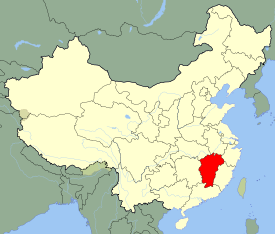
Hakka forms a language group of varieties of Chinese, spoken natively by the Hakka people in parts of Southern China and some diaspora areas of Taiwan, Southeast Asia and in overseas Chinese communities around the world.
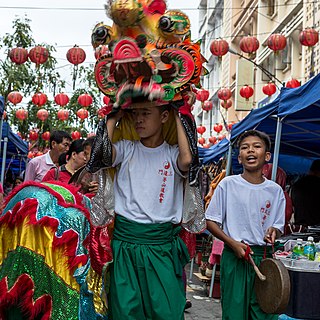
The Hakka, sometimes also referred to as Hakka Han, or Hakka Chinese, or Hakkas, are a Han Chinese subgroup whose ancestral homes are chiefly in the Hakka-speaking provincial areas of Guangdong, Fujian, Jiangxi, Guangxi, Sichuan, Hunan, Zhejiang, Hainan, and Guizhou in China, as well as in Taoyuan City, Hsinchu County, Miaoli County, Pingtung County, and Kaohsiung City in Taiwan. Unlike other Han Chinese subgroups, the Hakkas are not named after a geographical region, e.g. a province, county or city, in China. That is because their origins were of northern Chinese refugees fleeing social unrest, upheaval and invasions throughout the northern parts of China throughout history who then sought sanctuary in the south where the Cantonese speaking provinces such as Guangdong and Guangxi are. The Chinese characters for Hakka literally means "guest families". The word is Cantonese in origin and as the name implies, they are the guest of the Cantonese people. Over the centuries though, they have since more or less assimilated with the Cantonese speaking population. Modern day Hakka are generally identified by both full Hakka and by different degrees of Hakka ancestry and usually speak Hakka Chinese.

Jiangxi is a landlocked province in the east of the People's Republic of China. Its major cities include Nanchang and Jiujiang. Spanning from the banks of the Yangtze river in the north into hillier areas in the south and east, it shares a border with Anhui to the north, Zhejiang to the northeast, Fujian to the east, Guangdong to the south, Hunan to the west, and Hubei to the northwest.
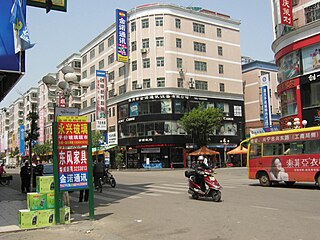
Xingning is a county-level city, under the jurisdiction of Meizhou City, Guangdong Province, China. The second largest city in eastern Guangdong, Xingning has an area of 2,104.85 square kilometres (812.69 sq mi) and a population of 1.13 million.

A Hakka walled village is a large multi-family communal living structure that is designed to be easily defensible. This building style is unique to the Hakka people found in southern China. Walled villages are typically designed for defensive purposes and consist of one entrance and no windows at the ground level.
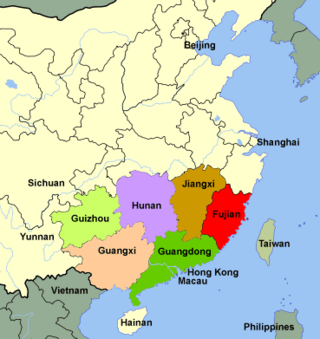
The music of the southern China has many features that are distinct from the rest of the country. For instance, many folk songs only use three notes. The region is home to significant populations of ethnic minorities, such as the Zhuang, Miao, She and Tai peoples.

Music of Guangdong is a synthesis of a number of local Guangdong folk music styles.
A Tea-picking opera is a form of musical entertainment.
Ninghua is a county of the prefecture-level city of Sanming, in western Fujian province, People's Republic of China, bordering Jiangxi to the west. The town of Shibi of Ninghua is well known as the cradle of the Hakka. Ninghua is also marked as the starting place of the famous massive Long March undertaken by the Red Army of the Chinese Communist Party in 1934.

Shicheng County is a county in the southeast of Jiangxi province, People's Republic of China, bordering Fujian province to the east. It is the easternmost county-level division of the prefecture-level city of Ganzhou.
Shan'ge is a genre of Chinese folk song. They are commonly sung in rural provinces; the word "Shan'ge" means "mountain song".
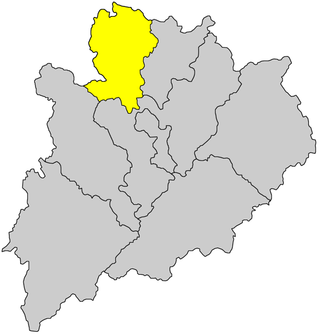
Pingyuan County is a county in the northeast of Guangdong Province, People's Republic of China. It is under the administration of Meizhou City.
A National Cultural Ecosystem Conservation Area (NCECA) is a specific area designated by the Ministry of Culture and Tourism of the People's Republic of China. Created to holistically protecting cultural patterns that are historically and culturally rich, in good state of existence and have important values and distinctive features, its core function is to preserve the intangible cultural heritage in China.

The Gan-speaking Chinese or Jiangxi people or Jiangyou people or Kiang-Si people are a subgroup of Han Chinese people. The origin of Gan-speaking people in China are from Jiangxi province in China. Gan-speaking populations are also found in Fujian, southern Anhui and Hubei provinces, and linguistic enclaves are found on Shaanxi, Sichuan, Zhejiang, Hunan, Hainan, Guangdong, Fujian and non-Gan speaking southern and western Jiangxi.

Shixing County is a county of Shaoguan, Guangdong province, China, bordering Jiangxi province to the east. The native variety of Chinese in the area is Hakka.
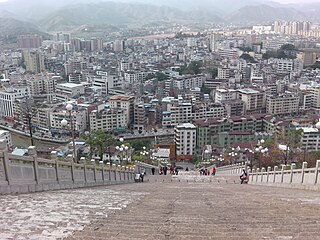
Heping is a county of northeastern Guangdong Province, China, bordering Jiangxi to the north. It is under the administration of Heyuan City. At the 2010 census, its population was around 300,000, with the majority of the residents being Hakka.

The culture of Jiangxi refers to the culture of the people based in or with origins in Jiangxi province, China. It has changed greatly over several millennia, from the land's prehistoric period to its contemporary culture, which incorporates ancient and traditional Chinese culture and modern culture influenced by Western culture.

The National Taiwan College of Performing Arts is a public college located in Taipei, Taiwan.
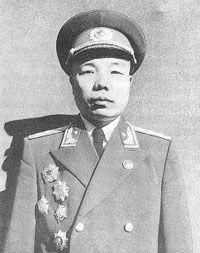
Xiao Hua, also known as Xiao Yizun (萧以尊), was a general of the Chinese People's Liberation Army. He was a Hakka from Xingguo County, Jiangxi Province.
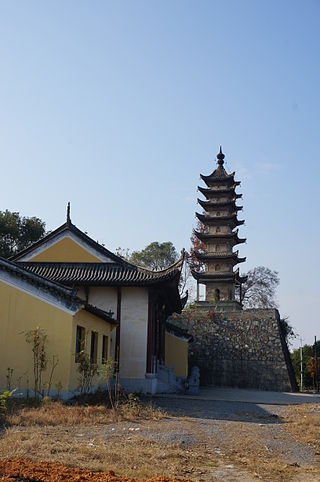
Wuyue culture refers to the regional Chinese culture of the Wuyue people, a Han Chinese subgroup that has historically been the dominant demographic in the region of Jiangnan. Wuyue culture is characterized as being delicate, graceful and refined, having preserved many unique cultural traditions nonextant in other regions of China.

